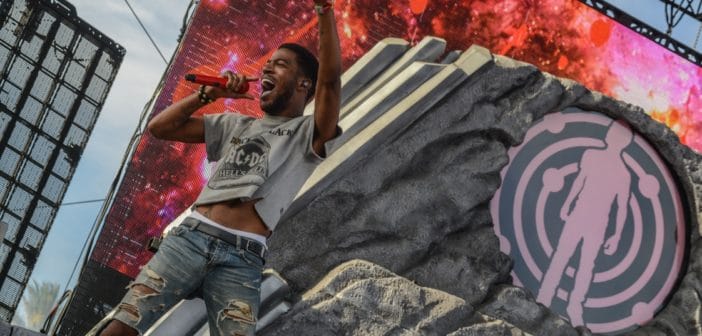 Fact: it’s hard out there for a black man, and hip hop’s finest have always represented the struggle of making it in a world that’s stacked against them. In the current political and cultural climate—Black Lives Matter, new hashtags trending daily with the names of black men shot and killed by police officers, the end of Obama’s presidency—the struggle is real, and getting realer. So it should perhaps come as no surprise that rapper Kid Cudi checked into rehab earlier this month to get treatment for depression and suicidal urges.
Fact: it’s hard out there for a black man, and hip hop’s finest have always represented the struggle of making it in a world that’s stacked against them. In the current political and cultural climate—Black Lives Matter, new hashtags trending daily with the names of black men shot and killed by police officers, the end of Obama’s presidency—the struggle is real, and getting realer. So it should perhaps come as no surprise that rapper Kid Cudi checked into rehab earlier this month to get treatment for depression and suicidal urges.
Yeah, It’s a Black Thing
According to the National Alliance on Mental Illness, 18.2% of Americans have a mental illness. African Americans are 20% more likely to contend with mental health issues, especially depression, PTSD, and anxiety. Add some institutional, systemic racism and a thick layer of mental health stigma, and that’s too much for anyone to handle. Comedian EvelynFromtheInternets says her only recourse is to “call in black” and spend the day in bed. Jokes aside, chronic mental illnesses can be life threatening; in Cudi’s case, his depression and loneliness led him to think about ending his life.
In a Facebook post, Cudi said, “If I didn’t come here, I would’ve done something to myself. I simply am a damaged human swimming in a pool of emotions everyday of my life.” Cudi described feeling increasingly depressed and isolated, too aware of the difficulty of day-to-day life, writing, “I don’t trust anyone because of it and I’m tired of being held back in my life. I deserve to have peace. I deserve to be happy and smiling. Why not me?”
Why Not Me?
It’s the “why not” that is speaking loud and clear to other people of color, online and in real life. Shortly after Cudi’s announcement, #YouGoodMan started trending on Twitter. “It’s time to open up the conversation about black men and mental health,” one person said. Even Kanye West, who Cudi took a few jabs at earlier this year, paused for a moment at a concert in Houston to wish the rapper well. “I just wanted to take time out to say Kid Cudi is my brother and I hope he’s doing well,” he said in a rare moment of non self-obsession. Many others opened up to share their own stories, in solidarity with Cudi.
The outlier is Drake, who recently released a single called “Two Birds, One Stone.” He dissed Cudi, alluding to the rapper’s depression and saying “You were the Man on the Moon, now you go through your phases, life of the angry and famous. You stay xan and perked* up so when reality set in you don’t gotta face it.” Fans are angry about Drake’s jabs, claiming they are “adding to the terrible misconceptions of mental illness.” [*on Xanax and Percocet, for those who don’t speak hip hop]
The Struggle Is the Realest
The consensus seems to be of awe and respect to Cudi for coming out and being honest about his struggle—a level of realness that sometimes gets buried in the swagger of hip hop culture. Looking at the lyrics of great rappers, from Notorious B.I.G to the Wu Tang to Nicki Minaj, themes of black struggle and success can be found on every album. Biggie, in his opening lick on “Juicy,” says:
Yeah, this album is dedicated
To all the teachers that told me I’d never amount to nuttin
To all the people that lived above the buildings that I was hustling in front of
Called the police on me when I was just trying to make some money to feed my daughter
And all the niggas in the struggle
Nicki Minaj, who’s also been open about her rough roots—crack addict father, working to support her mother—talks struggle in “I’m the Best,” the first track on Pink Friday.
I ain’t gotta get a plaque, I ain’t gotta get awards
I just walk up out the door all the girls will applaud.
All the girls will commend as long as they understand
That I’m fighting for the girls that never thought they could win.
Cause before they could begin you told them it was the end
But I am here to reverse the curse that they live in.
It’s tough being black, and tougher being black and poor, they say. The solution is to just keep on fighting, rising against the tide. In “Man on the Moon,” Cudi raps, “my mind is all crazy, crazy, crazy, crazy.” Well, crazy is one thing; the response to his admission is enough to suggest that it’s not just Cudi who’s out of whack.
Photo courtesy of THE BULL PEN (Coachella Day 2 2ndWeek – Kid Cudi) [CC0], via Wikimedia Commons (resized and cropped)
Sponsored DISCLAIMER: This is a paid advertisement for California Behavioral Health, LLC, a CA licensed substance abuse treatment provider and not a service provided by The Fix. Calls to this number are answered by CBH, free and without obligation to the consumer. No one who answers the call receives a fee based upon the consumer’s choice to enter treatment. For additional info on other treatment providers and options visit www.samhsa.gov.




